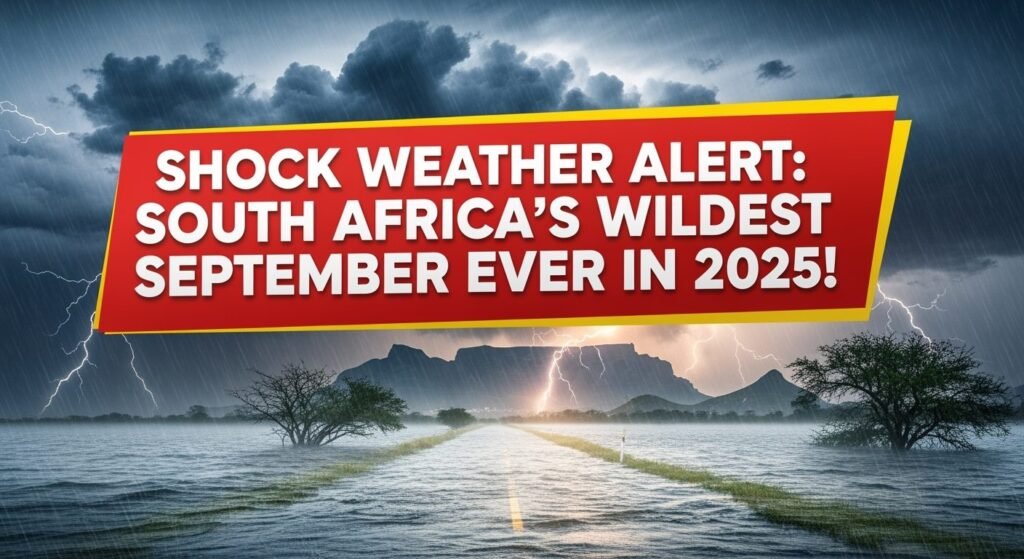South Africa weather alert: As we approach September 2025, meteorological services across South Africa are issuing urgent warnings about impending severe weather conditions. I’ve been monitoring these developments closely, and I must say the forecasts look concerning. Multiple provinces are expected to experience intense storms and potential flooding that could disrupt daily life and pose significant safety risks. Have you started preparing for what might be one of the most severe weather events in recent years? The South African Weather Service has emphasized that these aren’t typical seasonal rains but rather extraordinary weather patterns requiring special attention and preparation.

What Regions Will Be Most Affected?
The coastal provinces of KwaZulu-Natal and Eastern Cape are predicted to bear the brunt of these severe weather systems. Port Elizabeth and Durban are particularly vulnerable, with rainfall projections exceeding 150mm in a 24-hour period in some areas. The Western Cape won’t be spared either, with Cape Town and surrounding areas expecting gale-force winds and heavy downpours. Inland provinces including Gauteng and Free State are also on alert for thunderstorms and flash flooding, especially in low-lying areas and informal settlements. I’m particularly concerned about the timing of these storms, as they coincide with the beginning of the school term in many regions, potentially affecting millions of students and parents.
Why This South Africa Weather Alert Is Serious
This isn’t just another seasonal weather pattern. Climate scientists have linked these intensifying weather events to changing global climate patterns that are making extreme weather more frequent and severe across Southern Africa. The combination of saturated ground from earlier rainfall and the projected storm intensity creates a dangerous scenario for flash flooding and landslides. Infrastructure vulnerabilities across the country compound these risks, with aging drainage systems in urban areas particularly concerning. The economic impact could be substantial as well, with agricultural regions facing crop damage during a critical growing period. When severe weather struck similar regions in 2023, recovery efforts took months and cost billions of rand – and these upcoming storms are predicted to be even more intense.
How to Prepare for the Storms
Preparation is absolutely essential if you live in the affected regions. I recommend starting by securing your property – clear gutters and drains, trim tree branches that could damage structures, and move valuable items to higher ground if you’re in a flood-prone area. Create an emergency kit containing essential medications, important documents in waterproof containers, non-perishable food, and drinking water for at least three days. Stay informed through official channels like the South African Weather Service and local emergency management agencies. Their websites and social media accounts will provide the most accurate and timely updates. Consider downloading emergency alert apps that can provide real-time notifications specific to your location.
| Emergency Item | Quantity Recommended |
|---|---|
| Drinking water | 5 liters per person per day |
| Non-perishable food | 3-day supply minimum |
| Battery-powered radio | 1 with spare batteries |
When to Expect Emergency Response
The National Disaster Management Centre has already begun mobilizing resources in anticipation of the South Africa weather alert. Emergency response teams are being positioned strategically across the most vulnerable regions, with additional personnel on standby. However, I must emphasize that in widespread emergency situations, response times may be delayed. You should be prepared to be self-sufficient for at least 72 hours. If evacuation orders are issued for your area, please follow them promptly – don’t wait until conditions worsen. Community coordination will be vital, so consider establishing communication plans with neighbors, especially if you have elderly or disabled individuals nearby who might need assistance.
Previous Weather Emergency Response
During the 2023 floods in KwaZulu-Natal, many communities found themselves isolated for days before emergency services could reach them. Local resident Thabo Mkhize from Umlazi township recounted: “We had to rely on each other. Our neighborhood WhatsApp group became our lifeline, coordinating who needed help and who could offer it. Those who had prepared with extra supplies shared with others. It taught us that community preparation is just as important as individual preparation.” This experience highlights why advance planning and community coordination are essential aspects of storm preparedness.




